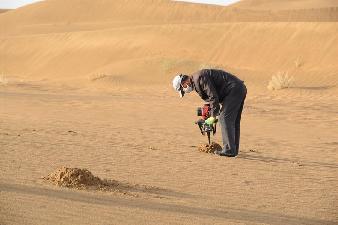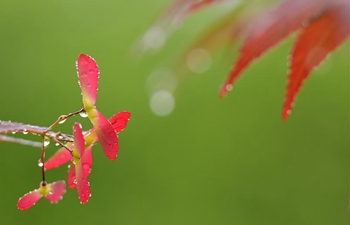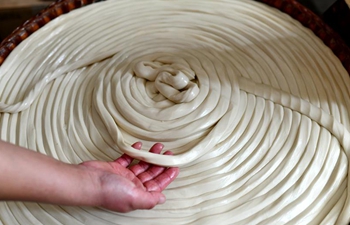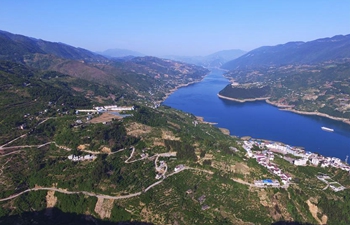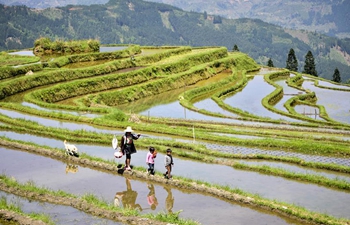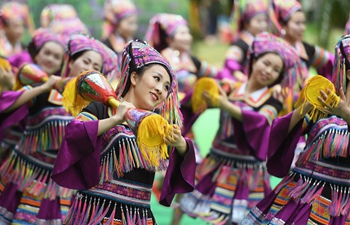YINCHUAN, April 22 (Xinhua) -- Stone and sand that have survived thousands of years of wind and rain in northwest China is now showing a new value: materials for collage.
Li Huixia, a 41-year-old farmer, is "painting" peonies on a drawing board in a studio in Zhongwei City on the southern edge of the Tengger Desert.
She makes the full heads of peonies by sticking and pasting pieces of red and pink stone on the board. The leaves were made from green stone and stems from apricot tree branches.
Unlike typical painters who draw pictures with watercolor or acrylic paints, Li's raw materials came from the desert and the banks of Yellow River, China's second longest river, near her home in Ningxia Hui Autonomous Region.
"I have been in love with painting since I was a child," Li said. "The stone collage gives me a way to realize my dream."
"The colored stones are the artwork of nature. What we do is to create masterpieces based on their natural shape and color to show local culture," said Duan Wei, head of Ningxia Weiyuansu Cultural Transmission Company, and owner of the studio.
In addition to stone collage, the studio also teaches local farmers like Li creating artworks with sand, another rich natural resource in the desert city.
"Besides desert sand, we have ore sand of nearly 40 different colors, such as reddish ironsand and green copper sand," said Yan Hengxiang, an experienced painter and calligrapher who teaches stone and sand crafts in the studio.
Farmers usually use stone to draw pictures of local delicacies such as Goji berries and melons, and local life, while the sand is used to create landscapes including deserts, mountains and rivers.
Depending on its size and complexity, each picture can sell from 500 yuan (around 80 U.S. dollars) to 36,000 yuan at local tourist attractions or at calligraphy and painting stores in big cities.
However, visitors doubted their authenticity at the beginning as the paintings were too real to be believed. Some doubters thought they were dyed.
In order to give a direct visual experience, Duan's company removes the glass frames on many collages at its exhibition hall, allowing visitors to touch them.
It also conducts experiments to convince people their work is natural, such as putting colored sand into a cup full of water to see if it loses color or not.
Duan loves to innovate. He has turned many sand collages into waterproof artwork after special treatment.
"Visitors can use wet cloth to wipe these pictures if they find the artworks are dirty," said Liu Peng, marketing director at the company.
The stone and sand collages have become popular.
Since Duan's company was established in July 2016, it has recorded sales of around 5 million yuan with 70 percent of products going to the markets of cities such as Beijing, Shanghai and Xiamen.
But Yan considers the difficulty in training farmers as the most tough task. Currently, the company only has four sand painters and eight stone painters.
"The farmers start from zero. And being an artist needs talent and inspiration," Yan said. "It's hard to recruit experienced craftsperson because of the remoteness of our studio and low salaries."
Rural women like Li who love painting and are easily pleased by a monthly wage of 2,000 yuan are their best choice.
After six months of training, Li brought her first stone peony collage to Yan, but it fell short of the latter's expectations. She didn't give up and appeared in the studio very early next morning to improve her work.
"The job needs imagination. Whenever and wherever you see a piece of stone, you need to consider what it could be used for," she said. "I'll try my best to let my stone collages go to more families, giving them an aesthetic feel."
Duan and Yan have a bigger ambition. They hope to work with tourists attractions or cultural authorities to open workshops, allowing tourists and citizens, in particular children, to create the artworks with stone and sand by themselves.
"In this way, they can have a better understanding of our hometown," Duan said.





